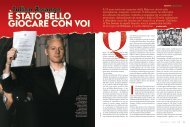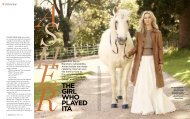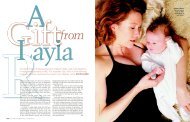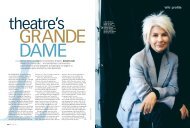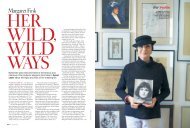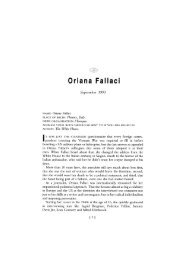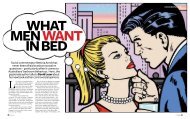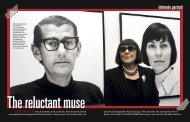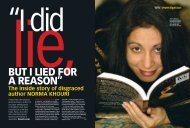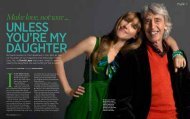Superstar housewife Dame Edna Everage has taken the - David Leser
Superstar housewife Dame Edna Everage has taken the - David Leser
Superstar housewife Dame Edna Everage has taken the - David Leser
Create successful ePaper yourself
Turn your PDF publications into a flip-book with our unique Google optimized e-Paper software.
him as a “club-footed fa<strong>the</strong>r of five transferred<br />
from <strong>the</strong> paper’s Madrid desk to <strong>the</strong><br />
position of drama critic”.<br />
In <strong>the</strong> late ’80s, Barry – or at least <strong>Edna</strong><br />
– returned with her own celebrity chat show:<br />
she sat in a sauna with Mel Gibson; she flirted<br />
with Richard Gere; she argued with Chevy<br />
C<strong>has</strong>e; she parried with Robin Williams; she<br />
danced with Rudolf Nureyev. She was <strong>the</strong><br />
megastar celebrity – a study of tyrannical selfaggrandisement,<br />
as well as a satire on celebrity<br />
itself.<br />
What was missing though, and what<br />
<strong>has</strong> always been an integral part of <strong>Edna</strong>’s<br />
phenomenal success in Australia and <strong>the</strong><br />
UK, was <strong>the</strong> interplay between her and<br />
her live audience. This was where she was at<br />
her best, insulting, bullying, mocking and<br />
teasing her audience, as <strong>the</strong>y’d never been<br />
mocked, bullied and teased before.<br />
It’s easy to assume we know who Barry<br />
Humphries is and what he stands for. After all,<br />
he’s been poking fun at his country of birth for<br />
<strong>the</strong> better part of 46 years, with his gallery of<br />
monstrous and maddening characters: <strong>Edna</strong>,<br />
of course, Sandy Stone, Sir Les Patterson and<br />
Lance Boyle, to name but a few.<br />
Perhaps <strong>the</strong> assumption is misplaced and<br />
now, more than at any o<strong>the</strong>r time given his US<br />
conquest, we may owe it to Barry – and maybe<br />
even to ourselves – to finally account for, and<br />
acknowledge, his unique place in Australia’s<br />
cultural firmament.<br />
“I have always believed,” says writer<br />
and broadcaster Phillip Adams, “that Barry<br />
Humphries is <strong>the</strong> greatest cultural figure<br />
we have produced. With The Adventures<br />
of Barry McKenzie [which Adams<br />
produced and Barry created], he found <strong>the</strong> first<br />
mass audience for Australian films. He rediscovered<br />
Australia in <strong>the</strong> late ‘50s and ‘60s. He<br />
also happens to be <strong>the</strong> greatest manipulator<br />
of a live audience in our time. No one comes<br />
within a bull’s roar of him.”<br />
John Lahr, <strong>the</strong> New Yorker’s <strong>the</strong>atre critic<br />
and one of Barry’s three biographers, goes<br />
even fur<strong>the</strong>r, describing him as “one of <strong>the</strong><br />
From left: A young Barry Humphries with his sister in <strong>the</strong> 1940s; <strong>Edna</strong> when she was plain<br />
“Mrs” in <strong>the</strong> 1960s; Barry, second wife Rosalind and daughters Tessa and Emily in <strong>the</strong> ’70s.<br />
What he is doing<br />
is performing a<br />
lifelong act of<br />
revenge which ...<br />
is <strong>the</strong> essence of<br />
good comedy.<br />
most prodigious comic talents” of <strong>the</strong> past<br />
century. “I don’t think Australia quite understands<br />
<strong>the</strong> tradition that he comes out of,”<br />
John says. “He <strong>has</strong> single-handedly brought<br />
<strong>the</strong> vaudeville tradition into <strong>the</strong> 21st century.<br />
And yet what he is [also] doing is performing a<br />
lifelong act of revenge which, of course, is <strong>the</strong><br />
essence of good comedy.”<br />
The revenge <strong>has</strong> many related targets:<br />
<strong>the</strong> “transcendental dullness” of ‘50s<br />
and ‘60s Melbourne and <strong>the</strong> blinkered<br />
compliance of <strong>the</strong> school system; <strong>the</strong><br />
absurdities of suburban life and all its<br />
dogmas and safe assumptions; and, of course,<br />
his parents, Eric and Louisa, who brought him<br />
into <strong>the</strong> world through <strong>the</strong> portal of middleclass<br />
Camberwell, in February 1934.<br />
His fa<strong>the</strong>r, Eric, was a circumspect man<br />
who built mock Elizabethan, neo-Georgian<br />
and Spanish-mission homes for a living. His<br />
mo<strong>the</strong>r, Louisa, was, by Barry’s own account,<br />
a reproachful and socially ambitious woman<br />
who “never spoke to foreigners” and who carried<br />
within her a life seemingly cordoned off<br />
to her son.<br />
In his 1993 autobiography, More Please,<br />
Barry describes <strong>the</strong> first ancient wound<br />
of his childhood when he asked his<br />
mo<strong>the</strong>r if she loved him. “Well,” she replied<br />
evasively, “naturally I love your fa<strong>the</strong>r most of<br />
all, and <strong>the</strong>n my mo<strong>the</strong>r and fa<strong>the</strong>r, and after<br />
that, you and your sister, just <strong>the</strong> same.” Barry<br />
still seems scarred by <strong>the</strong> inference. “Not to get<br />
a clear picture from one’s parents as to where<br />
one stood in <strong>the</strong>ir affections, that was a troubling<br />
thing,” he says softly.<br />
This was <strong>the</strong> deficient seed from which <strong>the</strong><br />
“queen of control”, <strong>Edna</strong> <strong>Everage</strong>, would eventually<br />
spring. <strong>Edna</strong> was <strong>the</strong> name of Barry’s<br />
favourite nanny, but what <strong>Edna</strong> reflected were<br />
<strong>the</strong> preoccupations of her time. “Cleanliness,<br />
cooking, interior decorations ... <strong>the</strong> things that<br />
The Women’s Weekly stood for,” Barry says. “The<br />
Weekly was <strong>the</strong> Gideon’s Bible of <strong>the</strong> period. It<br />
was chubby. It took a week to read. It was all<br />
you needed.<br />
“So a lot of <strong>the</strong> kitschy mythology of my<br />
youth came from commercial radio, and periodicals<br />
like The Weekly all fed into this family<br />
life and how things should be ... Authors hadn’t<br />
really looked to that little corner of Australian<br />
life, what I feel is not just a corner but a cornerstone<br />
of Australian life – suburban life and<br />
its oppressive nature, its bigotries, its cosy selfconfidence.<br />
“I railed against [that] in this comicstrip<br />
invention of <strong>the</strong> 1950s and I was<br />
genuinely astonished when journalists<br />
said, ‘Well, is this someone in your family?’<br />
And I thought to myself, ‘Well, it’s several<br />
people and certainly it’s something<br />
in which my mo<strong>the</strong>r’s influence participated.<br />
It was something to do with aunts. I<br />
think I once said that if England is <strong>the</strong> mo<strong>the</strong>rland<br />
and Germany <strong>the</strong> fa<strong>the</strong>rland, <strong>the</strong>n Australia<br />
is <strong>the</strong> auntyland.”<br />
<strong>Edna</strong>’s last name was <strong>Everage</strong>, because she<br />
was average. She was married to Norm, because<br />
he was normal.<br />
“I invented <strong>Edna</strong> because I hated her,”<br />
Barry <strong>has</strong> said. “She was a silly, ignorant,<br />
self-satisfied <strong>housewife</strong>. I suppose one<br />
grows up with a desire to murder one’s<br />
parents, but you can’t go and really do<br />
that. So I suppose I tried to murder <strong>the</strong>m<br />
symbolically on stage. I poured out my hatred<br />
of <strong>the</strong> standards of <strong>the</strong> little people of <strong>the</strong>ir<br />
generation.”<br />
▲<br />
THE AUSTRALIAN WOMEN’S WEEKLY – OCTOBER 2001 41



